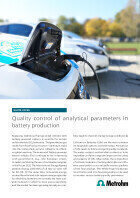Laboratory Products
Quality control of analytical parameters in battery production
Nov 23 2022
Author: Metrohm on behalf of Metrohm AG
Lithium-ion batteries (Li-ion batteries) are the most common rechargeable energy storage options available today. Production of Li-ion batteries needs to follow stringent quality standards. The water content, residual alkali content, or ionic impurities can have a negative impact on the safety and storage capacity of the final battery. Meanwhile, the composition of cathode materials or electrolyte can influence manufacturing costs and performance qualities of Li-ion batteries. This White Paper elaborates how titration and ion chromatography can be used to monitor various quality parameters during lithium-ion battery production.
- Traces of water can negatively impact the electrochemical performance of lithium-ion batteries, lead to the formation of toxic HF, and change the residual alkali content. Coulometric Karl Fischer titration is ideal for determining water content at trace levels in various Li-ion battery materials and components.
- Residual alkali (surface bases) can form when cathode materials are exposed to ambient air. A high residual alkali content can negatively impact the slurry preparation of the cathode. Gelation can occur, causing processing problems during the battery manufacturing process. Acid-base titration can be used to determine not only the residual alkali content but also the purity of lithium raw materials.
- Cathodes of Li-ion batteries are usually lithium metal oxides. The most common metals are cobalt, nickel, manganese, or iron. The knowledge of the exact metal composition of the starting solutions and of the final cathode is essential for optimizing manufacturing costs. Potentiometric titration is a proven and cost-effective analysis technology used to determine the metal composition of cathode materials.
- Lithium hexafluorophosphate (LiPF6) is the main source of lithium ions used in electrolyte. However, LiPF6 is not a stable salt and therefore lithium borate salts or imide-based lithium salts are often used as additives. Ion chromatography is a suitable analytical technology to determine the composition of the various lithium salts within the electrolyte.
- Ionic impurities in Li-ion batteries have a detrimental effect on battery performance. For example, they can negatively influence the solid electrolyte interphase (SEI). Ion chromatography is ideal for detecting ionic impurities at trace levels in the raw materials used to produce the electrolyte, cathode, or anode materials.
Read the complete white paper to learn more about the chemical analysis of these quality parameters for lithium-ion battery production.
Digital Edition
ILM 49.5 July
July 2024
Chromatography Articles - Understanding PFAS: Analysis and Implications Mass Spectrometry & Spectroscopy Articles - MS detection of Alzheimer’s blood-based biomarkers LIMS - Essent...
View all digital editions
Events
Jul 28 2024 San Diego, CA USA
Jul 30 2024 Jakarta, Indonesia
Jul 31 2024 Chengdu, China
ACS National Meeting - Fall 2024
Aug 18 2024 Denver, CO, USA
Aug 25 2024 Copenhagen, Denmark

24_06.jpg)













